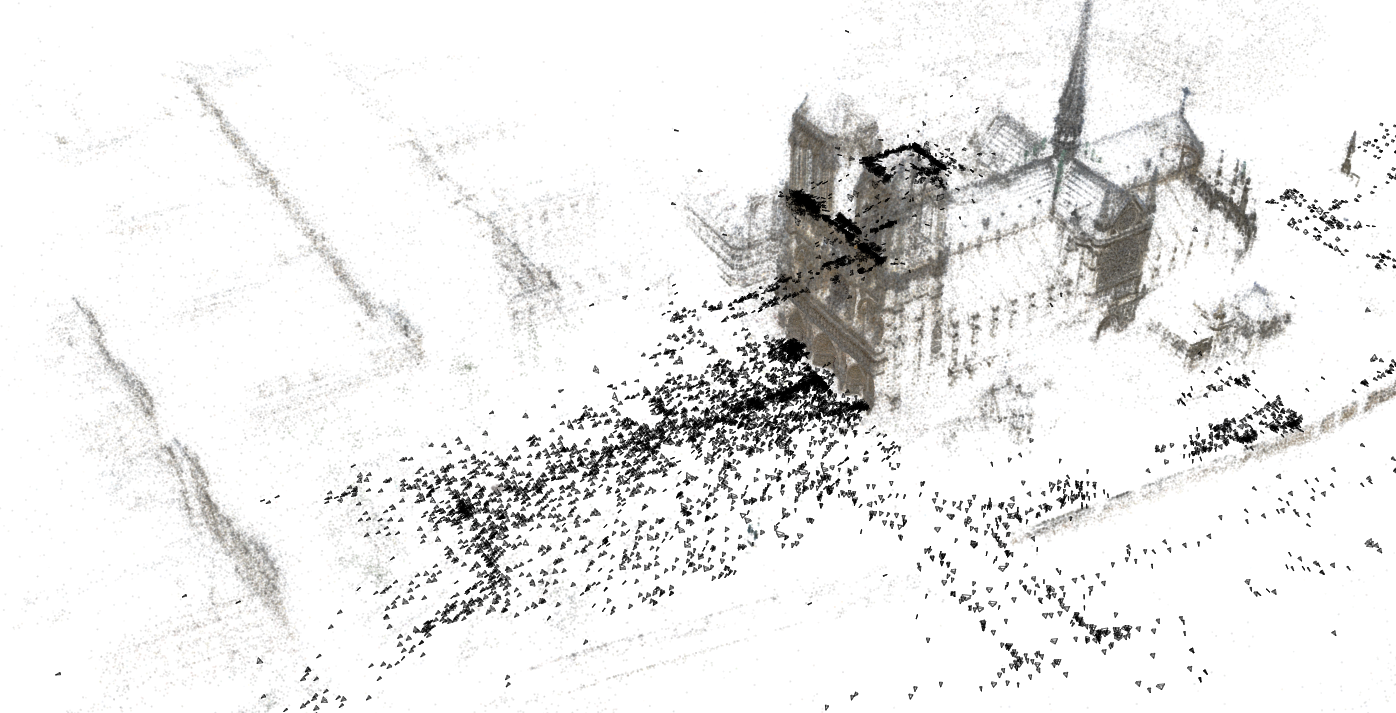Kyle Wilson

Education
- B.S. Mathematics, Rose-Hulman Institute of Technology. 2011
- B.S. Mechanical Engineering, Rose-Hulman Institute of Technology. 2011
- M.S. Applied Mathematics, Cornell University, 2014
- Ph. D. Applied Mathematics, Cornell University, 2016
Interests
My training is in numerics and optimization – solving hard math problems on computers. Around the department, I end up involved with most projects that touch on computer vision (my core research area), data science, machine learning, and algorithms. I love it when a piece of juicy theory lends a big insight, but I'm enough of an empiricist to not trust a claim until I can test it.
Research
I study geometric reconstruction problems in Computer Vision. The picture below shows a model of Notre Dame cathedral in Paris that was automatically generated from thousands of tourist photos. At its core this is a very large, very hard math problem. We're looking for geometric parameters that lead to models which look like our photos. Following up on my advisor's pioneering work, I work on understanding the complicated behaviors and failure modes of these problems, and how to pose them better.
My most recent project draws a parallel to the engineering world of vibration analysis, using flexible bouncing animations to visualize the primary modes of uncertainty in a reconstructed model. There's a interactive web demo here – let me know if you try it out!
Teaching
Here's what I've been teaching since I was hired at Washington College.
Recently, driven by student requests, I've been putting much of my teaching energy into designing new machine learning and data science classes. I've also been leading an effort to rework our intro sequence to be taught in Python.
Fall 2022: (we renumbered our course offerings)
- CSI 120 – Computer Science II
- CSI 220 – Data Science
- CSI 380 – Algorithms
Spring 2021:
- MAT 107 – Stretch Calculus (2 sections)
- CSI 202 – Computer Science II
Fall 2021:
- MAT 109 – Statistical Inference and Data Analysis (2 sections)
- CSI 202 – Computer Science II
Spring 2021 (online, COVID):
- CSI 201 – Computer Science I (2 sections)
- CSI 394 – Special Topics: Machine Learning
Fall 2020 (online, COVID):
- CSI 201 – Computer Science I (2 sections)
- CSI 294 – Special Topics: Intro to Data Science
Spring 2020 (half online, COVID):
- CSI 201 – Computer Science I (2 sections)
- CSI 370 – Design and Analysis of Algorithms
Fall 2019:
- On Junior Leave – talk to me about my research!
Spring 2019:
- CSI 202 – Computer Science II (2 sections)
- CSI 370 – Design and Analysis of Algorithms
Fall 2018:
- CSI 100 – Basics of Computing (2 sections)
- CSI 394 – Special Topics: Intro to Data Science
Spring 2018:
- CSI 100 – Basics of Computing
- CSI 202 – Computer Science II
- MAT 202 – Integral Calculus
Fall 2017:
- CSI 100 – Basics of Computing
- CSI 202 – Computer Science II
- CSI 494 – Special Topics: Computer Vision
Spring 2016:
- CSI 100 – Basics of Computing (2 sections)
- CSI 370 – Design and Analysis of Algorithms
Fall 2016:
- CSI 100 – Basics of Computing (2 sections)
- CSI 201 – Computer Science I
